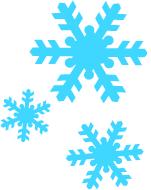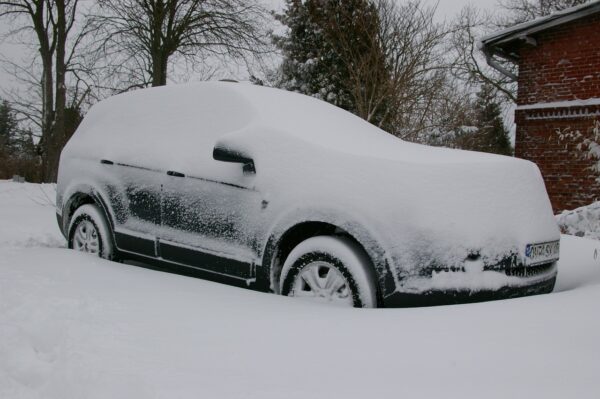Listen to this article
 Meteorologists are predicting heavy snowfall for this weekend, with the possibility that the storm may even surpass the memorable Blizzard of ’03. Here’s where you can find more information on safeguarding your property from damage, and addressing any problems that might occur:
Meteorologists are predicting heavy snowfall for this weekend, with the possibility that the storm may even surpass the memorable Blizzard of ’03. Here’s where you can find more information on safeguarding your property from damage, and addressing any problems that might occur:
Your Home
The Colorado Public Utilities Commission warns consumers to be sure to keep natural gas meters clear of ice and snow. Buildup could put pressure on the meter piping, leading to interrupted operation or even gas leaking into the home. For more information, see the PUC’s news release. Power outages are also possible during heavy snowstorms, so keep blankets and flashlights handy just in case. Candles and matches are not recommended during power outages because of the risk of fire.
Heavy snow can also cause roof leaks. Don’t fall victim to roof repair scams, which are common after storms. To learn how to protect yourself, see the Colorado Attorney General’s Roofing Scams page.
If your home is damaged, the Colorado Division of Insurance offers helpful tips in their publication Winter Weather and Insurance.
Your Vehicle
The Colorado Department of Transportation (CDOT) is strongly urging motorists to avoid traveling this weekend. They plan to concentrate on plowing major highways, so secondary roads may not get plowed at all, creating dangerous conditions. Some roads also may be closed. Therefore, CDOT recommends travel be limited to emergencies and essential needs only.
If you must travel, it is a good idea check road conditions before venturing out. Current conditions are available on CDOT’s cotrip.org website or, if you can’t get online, you can dial 511 for current road conditions. Also, make sure your vehicle is equipped with the proper tires or chains/traction. You can find information on chain laws and tire safety on CDOT’s Winter Driving website. Be sure also that you are prepared with the proper safety equipment in case of emergency. Refer to the website for a list of essentials. Additional winter driving tips can be found in publications from CDOT including:
- Winter Wise
- Slick Tips: Colorado Winter Driving Handbook
- Ice & Snow, Take it Slow!
- I-70 Eagle County Winter Travel Guide
 Finally, if are in an accident or your vehicle is damaged, check the Division of Insurance’s Winter Weather and Insurance for tips on what to do.
Finally, if are in an accident or your vehicle is damaged, check the Division of Insurance’s Winter Weather and Insurance for tips on what to do.
After the storm, when you’re ready to venture out again, remember not to leave your car idling unattended. This is known as “puffing” and is actually illegal, because it creates easy opportunity for auto theft. Information on preventing auto theft is available from the Colorado State Patrol.
Your Pets and Livestock
Blizzards and heavy snowfall can be a significant danger to livestock. Caring for Livestock Before Disaster, a publication from the Colorado State University Extension, offers helpful preparedness tips.
For household pets, Colorado State University offers the following tips for winter safety:
- Limit outdoor time if possible. Consider more frequent but shorter trips outside for work, potty, or play.
- Watch where you go. Ice can be dangerous for people and pets.
- Knit a sweater. Better yet, get Fido a water-resistant outdoor coat to help keep him warm and dry.
- Check the feet frequently. Snow between the toes causes hard and sometimes sharp ice balls that can be painful. Also, salt and de-icers can be damaging to the feet of dogs and cats. Be sure to wipe or wash off feet after animals have been outside in places that use these products, particularly before Fluffy cleans paws herself.
- Watch pet behavior. Animals will often let you know when they have had enough cold: Lifting feet, shaking, shivering, and searching for shelter are clues to bring your animals inside.
- Provide adequate water and food. Staying warm is hard work on the body; be sure to help your pet stay fueled. For outdoor animals, frequent water changes or a warming bowl may be needed.
- Provide good shelter if your dog or cat lives outside and either cannot or will not come in. Pet housing should be raised several inches off the ground. It should be big enough for the animal to turn around and lie down comfortably, but small enough to effectively collect body heat. Provide bedding for insulation inside the house.
- Make some noise. Outdoor cats and wildlife often seek shelter under the hood of your car in cold weather, so try to scare them out before you start the engine.
- Look for dangers in your house. Space heaters or bedding on or near heat registers can be dangerous for your dog and cat.
- Look for dangers in your garage. Antifreeze can be toxic for dogs and cats, so keep it in a safe place and clean up spills immediately.
- Check with your veterinarian if you have any concerns about your pet or her ability to handle the cold. Your veterinary team can offer suggestions for your pet.
- How to Spot the Differences Between Eagles and Hawks - August 16, 2021
- How Transportation Projects Help Tell the Story of Colorado’s Past - August 9, 2021
- Time Machine Tuesday: The Night the Castlewood Canyon Dam Gave Way - August 3, 2021
